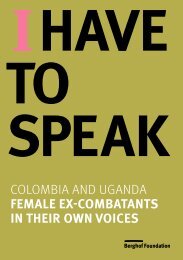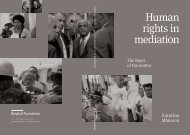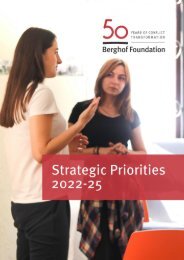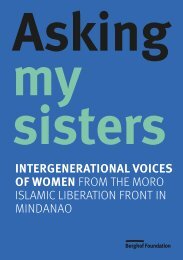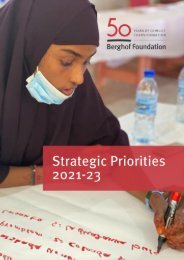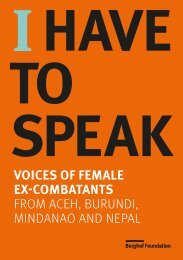Berghof Foundation: 50 years of conflict transformation
This book provides an overview of the Berghof Foundation’s work and impact over the past 50 years and sheds light on the challenges ahead of peacebuilding.
This book provides an overview of the Berghof Foundation’s work and impact over the past 50 years and sheds light on the challenges ahead of peacebuilding.
You also want an ePaper? Increase the reach of your titles
YUMPU automatically turns print PDFs into web optimized ePapers that Google loves.
Interview<br />
Anaiz<br />
Funosas<br />
Founder and<br />
president <strong>of</strong> the<br />
civil movement<br />
for peace Bake<br />
Bidea<br />
Putting<br />
civil<br />
society<br />
at the<br />
forefront<br />
<strong>of</strong> elected politicians in the North Basque Country,<br />
supported by international observers such as the<br />
<strong>Bergh<strong>of</strong></strong> <strong>Foundation</strong>. By structuring civil society<br />
around the peace process, we were able to create<br />
spaces <strong>of</strong> trust with politicians.<br />
Civil society taking charge <strong>of</strong> the peace process was<br />
unprecedented. How did you prepare for this role?<br />
I had always believed in a political solution<br />
to the <strong>conflict</strong>. In a phase <strong>of</strong> political confrontation,<br />
everything is perceived in a binary way, in two camps,<br />
the good and the bad. I had to deconstruct this<br />
paradigm, to learn the distinction between an enemy<br />
and a political opponent. I was privileged enough to<br />
be supported by activists and organisations like the<br />
<strong>Bergh<strong>of</strong></strong> <strong>Foundation</strong>. They taught us new methods<br />
to comprehend our situation and our objectives, to<br />
seek spaces <strong>of</strong> agreement and consensus, and to<br />
understand better the keys to a peace process. This<br />
led me to think differently about the future <strong>of</strong> my<br />
territory, and to seek a path to progress along with<br />
other people.<br />
Ten <strong>years</strong> after Aiete, we still have a long<br />
way to go, especially in dealing with the issue <strong>of</strong><br />
prisoners and victims. Since 2017, we have made a<br />
lot <strong>of</strong> progress on the conditions faced by political<br />
prisoners. Now we are working on the return<br />
<strong>of</strong> Basque prisoners and exiles. This is a major<br />
challenge, especially in a political context dominated<br />
by anti-terrorist rhetoric. The application <strong>of</strong> the law<br />
remains a major challenge in this process.<br />
Another challenge will be the work <strong>of</strong> memory to<br />
face our past. We need to design mechanisms for<br />
the recognition <strong>of</strong> all victims <strong>of</strong> <strong>conflict</strong> and their<br />
experiences <strong>of</strong> suffering, and to better understand<br />
the causes <strong>of</strong> the armed political <strong>conflict</strong>.<br />
The article on the previous page highlights the role <strong>of</strong><br />
civil society on the path to ETA’s disbandment. Why is<br />
the role <strong>of</strong> civil society in the Basque peace process<br />
exceptional?<br />
In the Northern (French) Basque Country,<br />
the absence <strong>of</strong> Basque institutions has meant that<br />
civil society has always played a very important role,<br />
both in the struggles related to the Basque language<br />
and in social activism that constructed alternatives<br />
in the agricultural and environmental sectors. This<br />
social activism has led to major advances such<br />
as the creation <strong>of</strong> the Basque Country Chamber<br />
<strong>of</strong> Agriculture and has placed civil society at the<br />
forefront <strong>of</strong> the struggle for disarmament and peace.<br />
Bake Bidea is one <strong>of</strong> the most influential civil society<br />
actors. What was your organisation’s role in the<br />
peace process?<br />
The roadmap developed at the 2011 Aiete<br />
conference placed civil society at the heart <strong>of</strong> the<br />
advancement <strong>of</strong> the peace process. This inspired us<br />
to create the civil movement Bake Bidea a year later,<br />
which represents various political, labour and human<br />
rights organisations in the north with the aim <strong>of</strong> giving<br />
impetus to the Aiete roadmap.<br />
We became the bridge between civil society<br />
and the elected representatives <strong>of</strong> the North Basque<br />
territory. Our forum brought together around <strong>50</strong>0<br />
people, representing all the NGOs and the majority<br />
What was the key to your success?<br />
We took the time to train ourselves.<br />
To be credible we had to be able to explain things.<br />
We brought in many experts, but they made us<br />
understand that we had the tools within ourselves<br />
to make things happen. I will never forget this<br />
experience during a forum in Biarritz to prepare the<br />
civil disarmament <strong>of</strong> ETA, when I asked the experts<br />
from the <strong>Bergh<strong>of</strong></strong> <strong>Foundation</strong> and Conciliation<br />
Resources to tell us how civil society was supporting<br />
disarmament processes in other countries. They<br />
looked at me and said, “there are no other examples,<br />
your case is unique!”<br />
So the experts are not there to give us<br />
the solutions, but to help us take a step back from<br />
ourselves. <strong>Bergh<strong>of</strong></strong>’s support allowed us to let go,<br />
to embrace unusual experiences in order to make<br />
things happen.<br />
The disarmament and disbandment were major<br />
milestones. But peace remains an ongoing process,<br />
as many other articles in this book show. With that in<br />
mind, what are the most important challenges for you<br />
and your movement in the <strong>years</strong> to come?<br />
88




